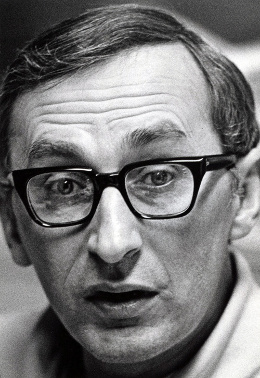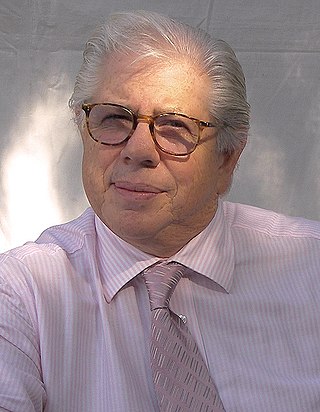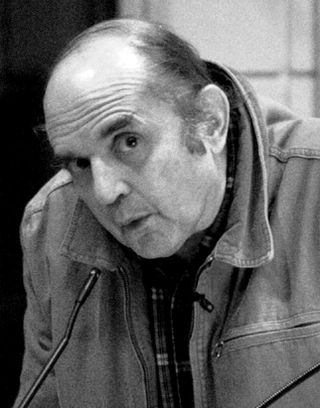Related Research Articles

Michael Royko Jr. was an American newspaper columnist from Chicago, Illinois. Over his 30-year career, he wrote more than 7,500 daily columns for the Chicago Daily News, the Chicago Sun-Times, and the Chicago Tribune. A humorist who focused on life in Chicago, he was the winner of the 1972 Pulitzer Prize for commentary.

Sleepless in Seattle is a 1993 American romantic comedy film directed by Nora Ephron, from a screenplay she wrote with David S. Ward and Jeff Arch. Starring Tom Hanks and Meg Ryan, the film follows a journalist (Ryan) who becomes enamored with a widowed architect (Hanks), when the latter's son calls in to a talk radio program requesting a new partner for his grieving father. In addition to Bill Pullman, Ross Malinger, and Rob Reiner, the film features Rosie O'Donnell, Gaby Hoffmann, Victor Garber, Rita Wilson, Barbara Garrick, and Carey Lowell.

Nora Ephron was an American journalist, writer, and filmmaker. She is best known for writing and directing romantic comedy films and received numerous accolades including a British Academy Film Award as well as nominations for three Academy Awards, a Golden Globe Award, a Tony Award and three Writers Guild of America Awards.

Louis "Studs" Terkel was an American writer, historian, actor, and broadcaster. He received the Pulitzer Prize for General Nonfiction in 1985 for The Good War and is best remembered for his oral histories of common Americans, and for hosting a long-running radio show in Chicago.

Carl Milton Bernstein is an American investigative journalist and author. While a young reporter for The Washington Post in 1972, Bernstein was teamed up with Bob Woodward, and the two did much of the original news reporting on the Watergate scandal. These scandals led to numerous government investigations and the eventual resignation of President Richard Nixon. The work of Woodward and Bernstein was called "maybe the single greatest reporting effort of all time" by long-time journalism figure Gene Roberts.

Harvey Lawrence Pekar was an American underground comic book writer, music critic, and media personality, best known for his autobiographical American Splendor comic series. In 2003, the series inspired a well-received film adaptation of the same name.

Sidney Joseph Perelman was an American humorist and screenwriter. He is best known for his humorous short pieces written over many years for The New Yorker. He also wrote for several other magazines, including Judge, as well as books, scripts, and screenplays. Perelman received an Academy Award for screenwriting in 1956.

Alfred Bertram "Bud" Guthrie Jr. was an American novelist, screenwriter, historian, and literary historian known for writing western stories. His novel The Way West won the 1950 Pulitzer Prize for Fiction, and his screenplay for Shane (1953) was nominated for an Academy Award.
Nathaniel Goddard Benchley was an American author from Massachusetts.

Looking for Mr. Goodbar is a novel by American writer Judith Rossner. Published in 1975, the book—a "stunning psychological study of a woman's passive complicity in her own death"—won critical acclaim and was a #1 New York Times best seller.

James Thomas Farrell was an American novelist, short-story writer and poet.

Harold Thomas Pace Hayes was an American journalist and writer best known as an editor for Esquire magazine from 1963 to 1973. He was a main architect of the New Journalism movement.

Working: People Talk About What They Do All Day and How They Feel About What They Do is a 1974 nonfiction book by the oral historian and radio broadcaster Studs Terkel.

John Leonard was an American literary, television, film, and cultural critic.

The Mark Eden bust developer was a device and regimen sold by the Mark Eden company of San Francisco, California, that promised to enlarge a woman's breasts. Jack and Eileen Feather, California based figure salon entrepreneurs, were the promoters of the device. The product was widely marketed in women's magazines during the 1960s and 1970s, making claims such as, "For thousands, Mark Eden has transformed flat bustlines into firm, shapely fullness." Its makers withdrew the product from the market following their indictment for mail fraud.
Laura Dave is an American novelist.

Love, Loss, and What I Wore is a play written by Nora and Delia Ephron based on the 1995 book of the same name by Ilene Beckerman. It is organized as a series of monologues and uses a rotating cast of five principal women. The subject matter of the monologues includes women's relationships and wardrobes and at times the interaction of the two, using the female wardrobe as a time capsule of a woman's life.
Lucky Guy is a play by Nora Ephron that premiered in 2013, the year after her death. It was Ephron's final work and marked Tom Hanks's Broadway debut, in which he earned a Theatre World Award. It depicts the story of journalist Mike McAlary beginning in 1985 and ending with his death at the age of 41 in 1998. The plot covers the high points and tribulations of McAlary's career as he traverses the clubby atmosphere of the New York City tabloid industry in what some regard as its heyday. The play includes his near fatal automobile accident and devotes a large portion to his recovery.
Lee Eisenberg is an American editor and author. He was the editor-in-chief of Esquire magazine throughout the 1970s and 1980s. Eisenberg is the author of several books, including The Number: A Completely Different Way to Think About the Rest of Your Life, which appeared on many national bestseller lists. His latest book is The Point Is: Birth, Death, and Everything in Between, published in February, 2016 by Twelve Books, an imprint of the Hachette Book Group.
References
- 1 2 Morris, Wesley (August 28, 2012). "'Why's this so good?' No. 56: Nora Ephron and the thing about breasts". Nieman Storyboard. Nieman Foundation for Journalism. Archived from the original on January 14, 2020. Retrieved June 28, 2020.
- ↑ Ephron, Nora (May 1, 1972). "A Few Words About Breasts". Esquire .
- 1 2 Bosman, Julie. "Two Out-of-Print Nora Ephron Books to Be Published as Single Volume," The New York Times September 19, 2012.
- 1 2 Fallon, Kevin. "Life, Death, and Everything Is Copy: Nora Ephron’s Final, Most Revealing Lessons," The Daily Beast March 21, 2016.
- 1 2 Borel, Kathryn. "An Interview with Nora Ephron", The Believer March 1, 2012.
- 1 2 3 Cohen, Richard. She Made Me Laugh: My Friend Nora Ephron. New York: Simon & Schuster, 2016. pp. 90–95.
- ↑ Wexler, Natalie. "The Flip Side of Nora Ephron", The Harvard Crimson August 5, 1975.
- ↑ "Nora Ephron on Crazy Salad", Blank on Blank.
- ↑ Terkel, Studs. "Nora Ephron discusses feminism and her book Crazy Salad", Studs Terkel Radio Archive, July 28, 1975.
- ↑ Levy, Ariel. "Nora Knows What to Do", The New Yorker, June 29, 2009.
- ↑ Brancaccio, David, and Jessi Klein. "A Few Words About Breasts", Esquire Classic podcast August 15, 2016.